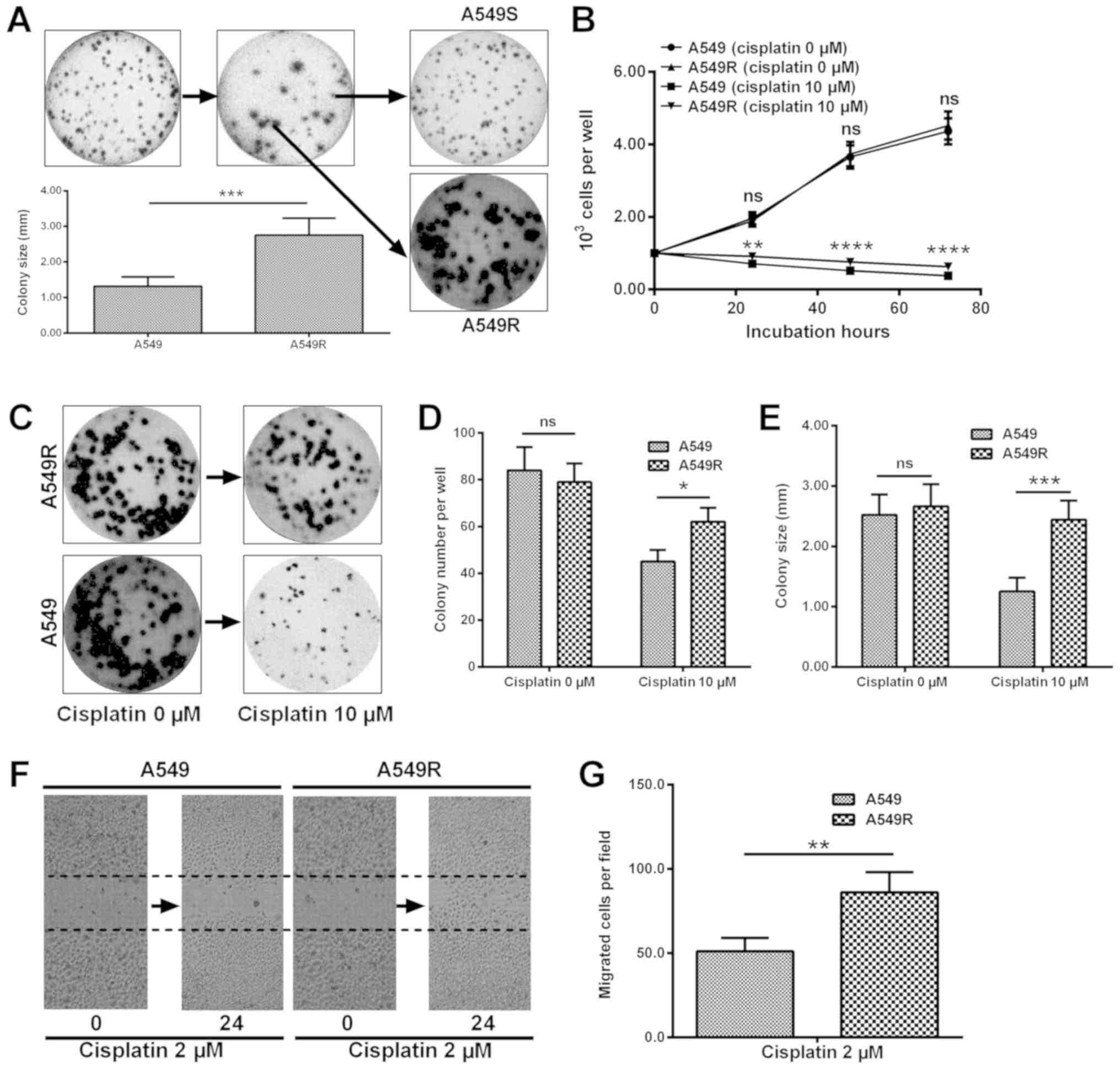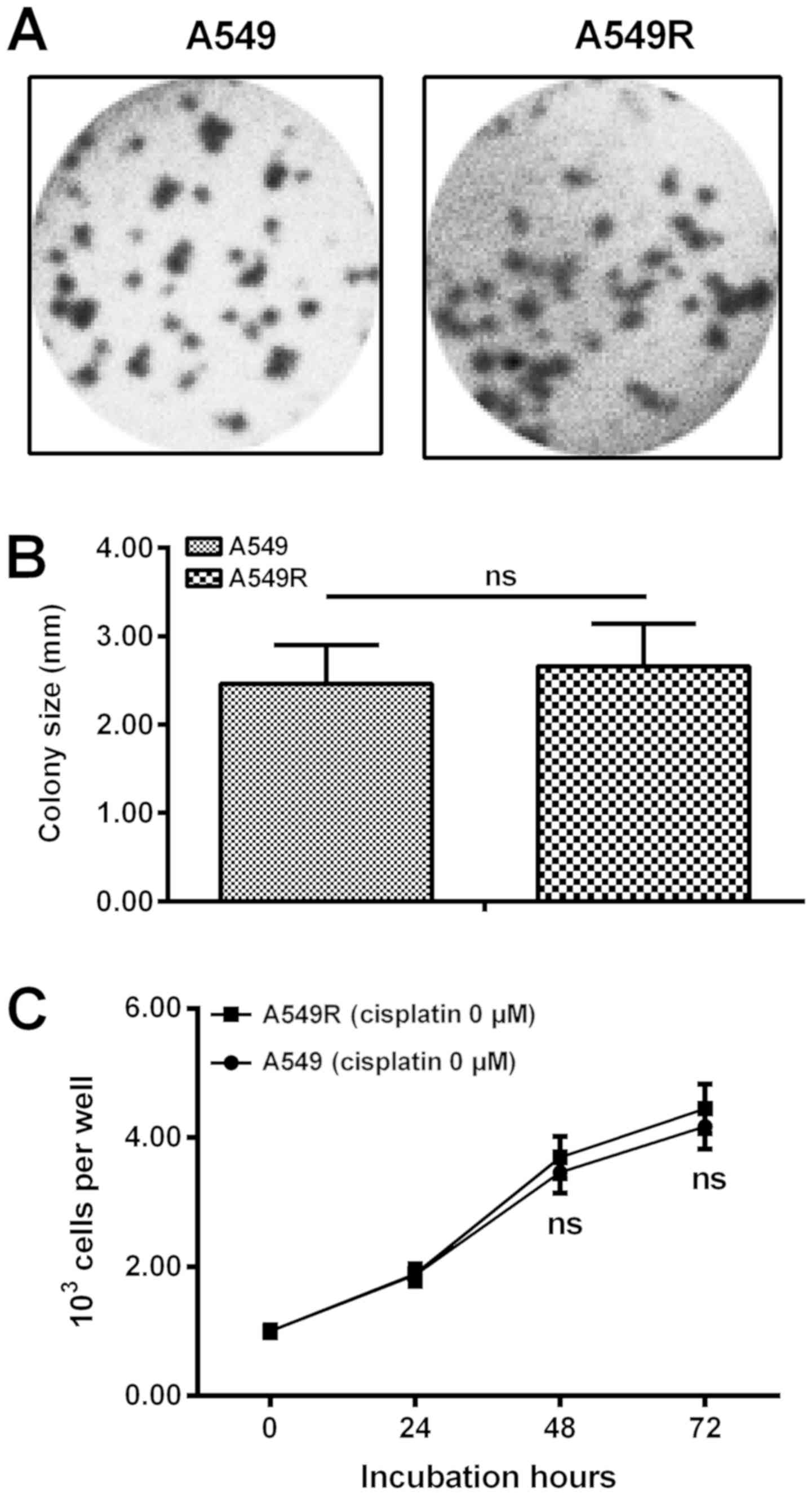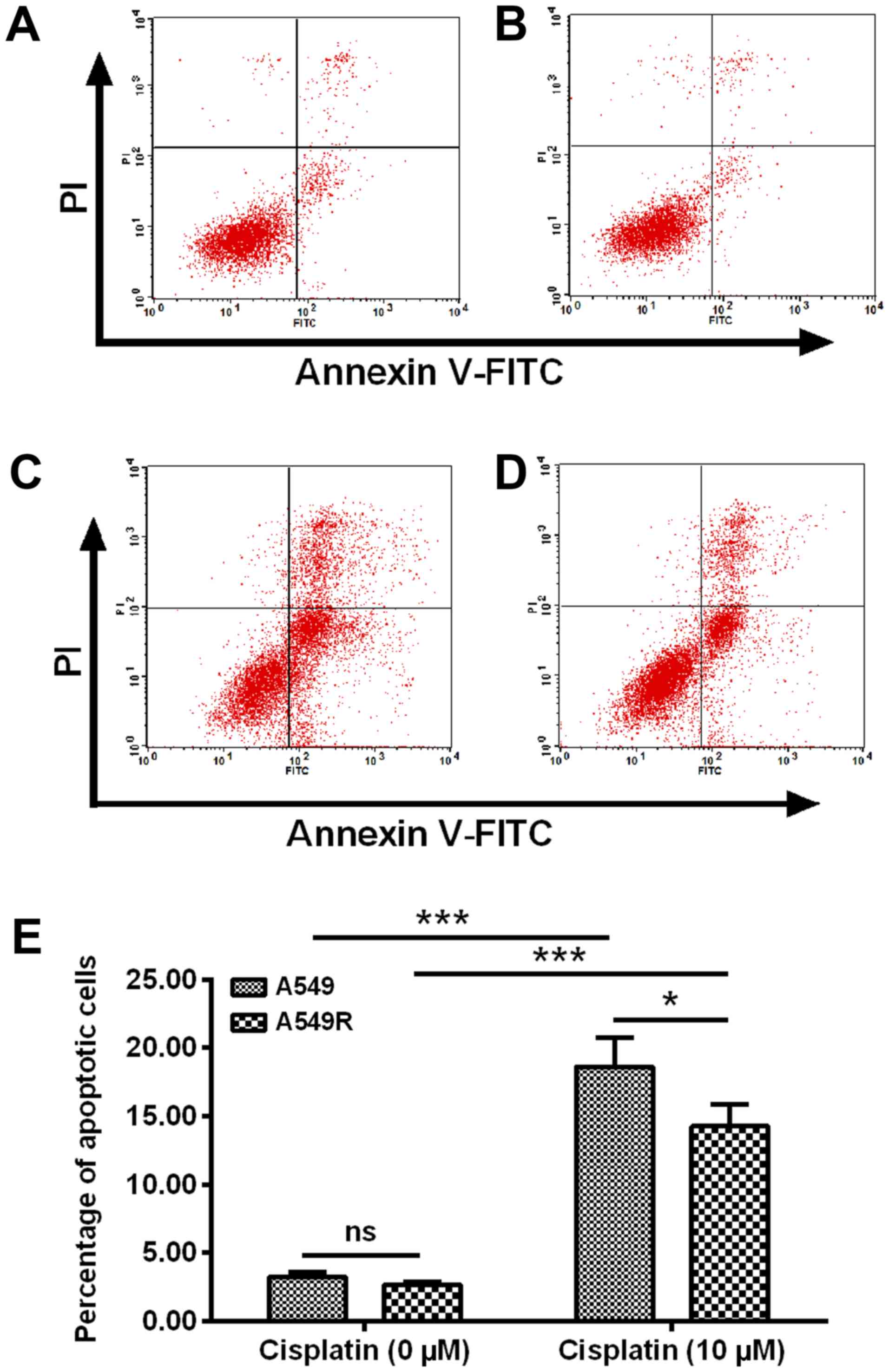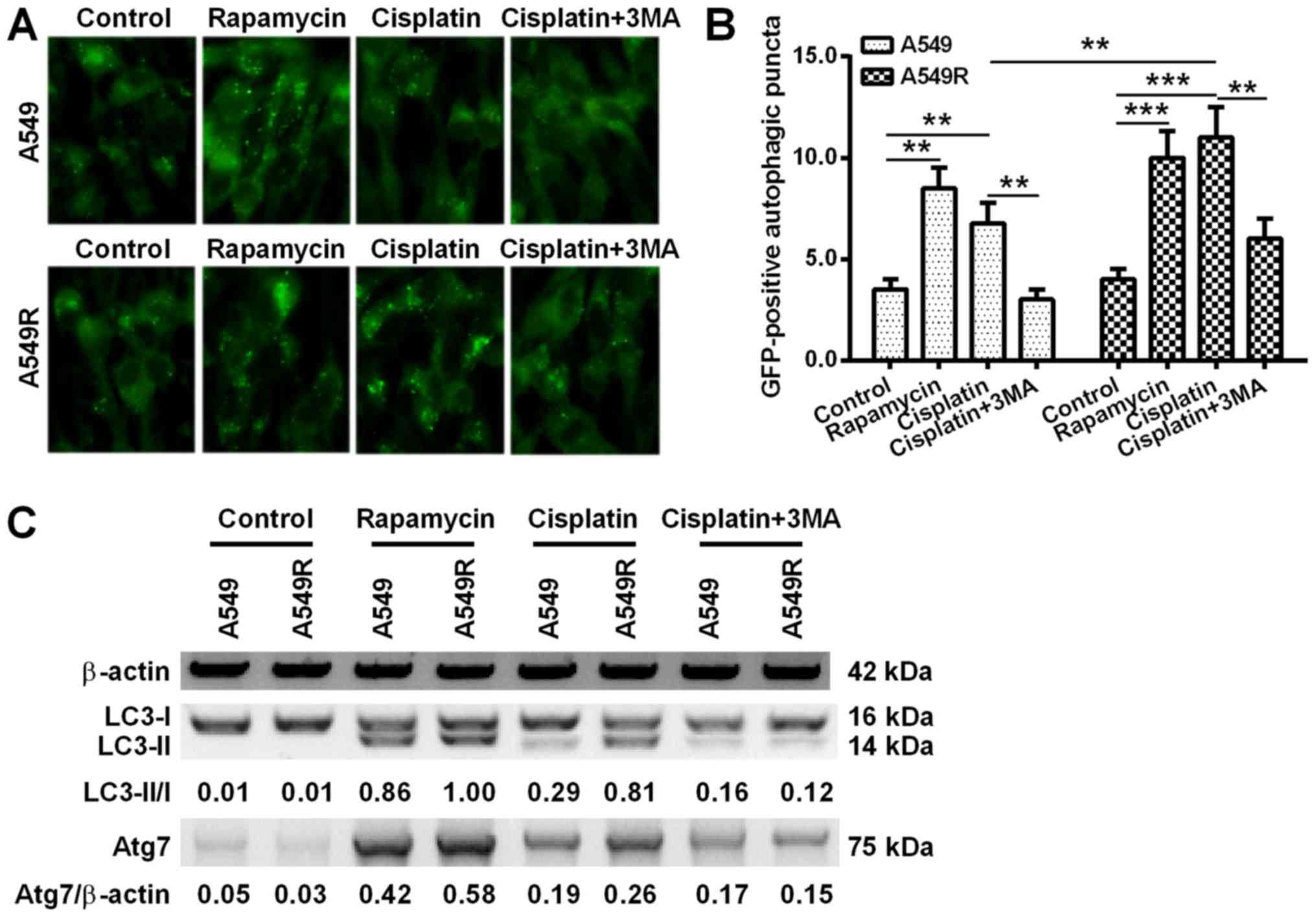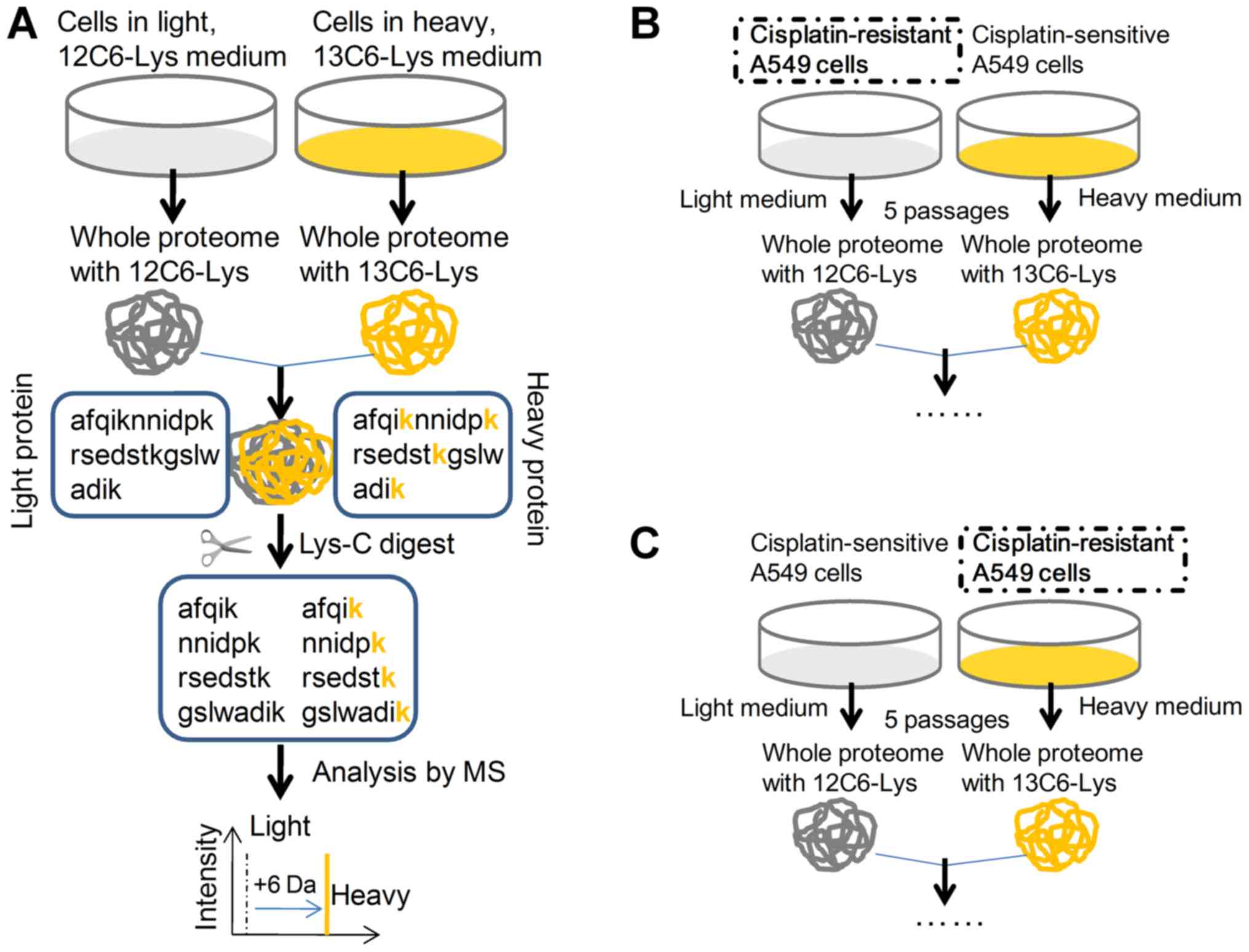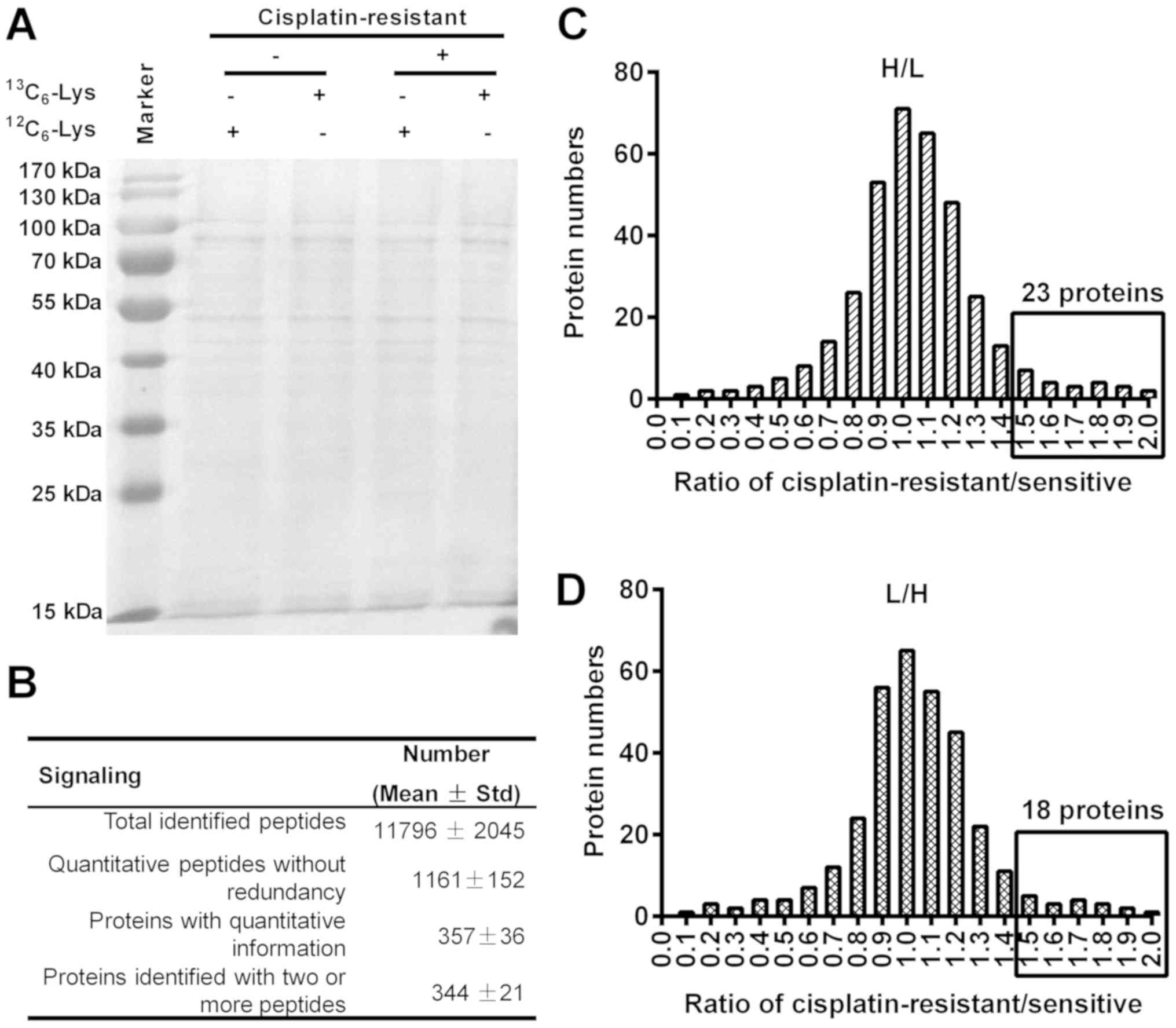|
1
|
Fidler MM, Soerjomataram I and Bray F: A
global view on cancer incidence and national levels of the human
development index. Int J Cancer. 139:2436–2446. 2016. View Article : Google Scholar : PubMed/NCBI
|
|
2
|
Shen C, Wang X, Tian L, Zhou Y, Chen D, Du
H, Wang W, Liu L and Che G: 'Different trend' in multiple primary
lung cancer and intrapulmonary metastasis. Eur J Med Res.
20:172015. View Article : Google Scholar
|
|
3
|
Kalemkerian GP: Advances in
pharmacotherapy of small cell lung cancer. Expert Opin
Pharmacother. 15:2385–2396. 2014. View Article : Google Scholar : PubMed/NCBI
|
|
4
|
Scagliotti GV, Parikh P, von Pawel J,
Biesma B, Vansteenkiste J, Manegold C, Serwatowski P, Gatzemeier U,
Digumarti R, Zukin M, et al: Phase III study comparing cisplatin
plus gemcitabine with cisplatin plus pemetrexed in
chemotherapy-naive patients with advanced-stage non-small-cell lung
cancer. J Clin Oncol. 26:3543–3551. 2008. View Article : Google Scholar : PubMed/NCBI
|
|
5
|
Socinski MA, Smit EF, Lorigan P, Konduri
K, Reck M, Szczesna A, Blakely J, Serwatowski P, Karaseva NA,
Ciuleanu T, et al: Phase III study of pemetrexed plus carboplatin
compared with etoposide plus carboplatin in chemotherapy-naive
patients with extensive-stage small-cell lung cancer. J Clin Oncol.
27:4787–4792. 2009. View Article : Google Scholar : PubMed/NCBI
|
|
6
|
Kim ES: Chemotherapy resistance in lung
cancer. Adv Exp Med Biol. 893:189–209. 2016. View Article : Google Scholar
|
|
7
|
Willers H, Azzoli CG, Santivasi WL and Xia
F: Basic mechanisms of therapeutic resistance to radiation and
chemotherapy in lung cancer. Cancer J. 19:200–207. 2013. View Article : Google Scholar : PubMed/NCBI
|
|
8
|
Zembutsu H, Ohnishi Y, Tsunoda T, Furukawa
Y, Katagiri T, Ueyama Y, Tamaoki N, Nomura T, Kitahara O, Yanagawa
R, et al: Genome-wide cDNA microarray screening to correlate gene
expression profiles with sensitivity of 85 human cancer xenografts
to anticancer drugs. Cancer Res. 62:518–527. 2002.PubMed/NCBI
|
|
9
|
Kihara C, Tsunoda T, Tanaka T, Yamana H,
Furukawa Y, Ono K, Kitahara O, Zembutsu H, Yanagawa R, Hirata K, et
al: Prediction of sensitivity of esophageal tumors to adjuvant
chemotherapy by cDNA microarray analysis of gene-expression
profiles. Cancer Res. 61:6474–6479. 2001.PubMed/NCBI
|
|
10
|
Beltran H, Yelensky R, Frampton GM, Park
K, Downing SR, MacDonald TY, Jarosz M, Lipson D, Tagawa ST, Nanus
DM, et al: Targeted next-generation sequencing of advanced prostate
cancer identifies potential therapeutic targets and disease
heterogeneity. Eur Urol. 63:920–926. 2013. View Article : Google Scholar :
|
|
11
|
Hoedt E, Zhang G and Neubert TA: Stable
isotope labeling by amino acids in cell culture (SILAC) for
quantitative proteomics. Adv Exp Med Biol. 806:93–106. 2014.
View Article : Google Scholar : PubMed/NCBI
|
|
12
|
Patella F, Neilson LJ, Athineos D, Erami
Z, Anderson KI, Blyth K, Ryan KM and Zanivan S: In-depth proteomics
identifies a role for autophagy in controlling reactive oxygen
species mediated endothelial permeability. J Proteome Res.
15:2187–2197. 2016. View Article : Google Scholar : PubMed/NCBI
|
|
13
|
Lanucara F and Eyers CE: Mass
spectrometric-based quantitative proteomics using SILAC. Methods
Enzymol. 500:133–150. 2011. View Article : Google Scholar : PubMed/NCBI
|
|
14
|
Yeh CC, Hsu CH, Shao YY, Ho WC, Tsai MH,
Feng WC and Chow LP: Integrated stable isotope labeling by amino
acids in cell culture (SILAC) and isobaric tags for relative and
absolute quantitation (iTRAQ) quantitative proteomic analysis
identifies galectin-1 as a potential biomarker for predicting
dorafenib resistance in liver cancer. Mol Cell Proteomics.
14:1527–1545. 2015. View Article : Google Scholar : PubMed/NCBI
|
|
15
|
Wu X, Zahari MS, Renuse S, Nirujogi RS,
Kim MS, Manda SS, Stearns V, Gabrielson E, Sukumar S and Pandey A:
Phosphoproteomic analysisidentifies focal adhesion kinase2 (FAK2)
as a potential therapeutic target for tamoxifen resistance in
breast cancer. Mol Cell Proteomics. 14:2887–2900. 2015. View Article : Google Scholar : PubMed/NCBI
|
|
16
|
Xu H, Dephoure N, Sun H, Zhang H, Fan F,
Liu J, Ning X, Dai S, Liu B, Gao M, et al: Proteomic profiling of
paclitaxel treated cells identifies a novel mechanism of drug
resistance mediated by PDCD4. J Proteome Res. 14:2480–2491. 2015.
View Article : Google Scholar : PubMed/NCBI
|
|
17
|
Bosse K, Haneder S, Arlt C, Ihling CH,
Seufferlein T and Sinz A: Mass spectrometry-based secretome
analysis of non-small cell lung cancer cell lines. Proteomics.
16:2801–2814. 2016. View Article : Google Scholar : PubMed/NCBI
|
|
18
|
Sun P, Feng LX, Zhang DM, Liu M, Liu W, Mi
T, Wu WY, Jiang BH, Yang M, Hu LH, et al: Bufalin derivative BF211
inhibits proteasome activity in human lung cancer cells in vitro by
inhibiting β1 subunit expression and disrupting proteasome
assembly. Acta Pharmacol Sin. 37:908–918. 2016. View Article : Google Scholar : PubMed/NCBI
|
|
19
|
Liu G, Pei F, Yang F, Li L, Amin AD, Liu
S, Buchan JR and Cho WC: Role of autophagy and apoptosis in
non-small-cell lung cancer. Int J Mol Sci. 18:182017.
|
|
20
|
Lee JG, Shin JH, Shim HS, Lee CY, Kim DJ,
Kim YS and Chung KY: Autophagy contributes to the chemo-resistance
of non-small cell lung cancer in hypoxic conditions. Respir Res.
16:1382015. View Article : Google Scholar : PubMed/NCBI
|
|
21
|
Liu M, Ma S, Liu M, Hou Y, Liang B, Su X
and Liu X: Synergistic killing of lung cancer cells by cisplatin
and radiation via autophagy and apoptosis. Oncol Lett. 7:1903–1910.
2014. View Article : Google Scholar : PubMed/NCBI
|
|
22
|
Pisters KM, Evans WK, Azzoli CG, Kris MG,
Smith CA, Desch CE, Somerfield MR, Brouwers MC, Darling G, Ellis
PM, et al Cancer Care Ontario; American Society of Clinical
Oncology: Cancer Care Ontario and American Society of Clinical
Oncology adjuvant chemotherapy and adjuvant radiation therapy for
stages I-IIIA resectable non small-cell lung cancer guideline. J
Clin Oncol. 25:5506–5518. 2007. View Article : Google Scholar : PubMed/NCBI
|
|
23
|
Paz-Ares L, Mezger J, Ciuleanu TE, Fischer
JR, von Pawel J, Provencio M, Kazarnowicz A, Losonczy G, de Castro
G Jr, Szczesna A, et al INSPIRE investigators: Necitumumab plus
pemetrexed and cisplatin as first-line therapy in patients with
stage IV non-squamous non-small-cell lung cancer (INSPIRE): An
open-label, randomised, controlled phase 3 study. Lancet Oncol.
16:328–337. 2015. View Article : Google Scholar : PubMed/NCBI
|
|
24
|
Lemjabbar-Alaoui H, Hassan OU, Yang YW and
Buchanan P: Lung cancer: Biology and treatment options. Biochim
Biophys Acta. 1856:189–210. 2015.PubMed/NCBI
|
|
25
|
Sánchez-Céspedes M: Lung cancer biology: A
genetic and genomic perspective. Clin Transl Oncol. 11:263–269.
2009. View Article : Google Scholar : PubMed/NCBI
|
|
26
|
Du J, Yang P, Kong F and Liu H: Aberrant
expression of translationally controlled tumor protein (TCTP) can
lead to radioactive susceptibility and chemosensitivity in lung
cancer cells. Oncotarget. 8:101922–101935. 2017. View Article : Google Scholar : PubMed/NCBI
|
|
27
|
Kim KM, Yu TK, Chu HH, Park HS, Jang KY,
Moon WS, Kang MJ, Lee DG, Kim MH, Lee JH, et al: Expression of ER
stress and autophagy-related molecules in human non-small cell lung
cancer and premalignant lesions. Int J Cancer. 131:E362–E370. 2012.
View Article : Google Scholar
|
|
28
|
Sun Q, Hua J, Wang Q, Xu W, Zhang J, Zhang
J, Kang J and Li M: Expressions of GRP78 and Bax associate with
differentiation, metastasis, and apoptosis in non-small cell lung
cancer. Mol Biol Rep. 39:6753–6761. 2012. View Article : Google Scholar : PubMed/NCBI
|
|
29
|
Ahmad M, Hahn IF and Chatterjee S: GRP78
up-regulation leads to hypersensitization to cisplatin in A549 lung
cancer cells. Anticancer Res. 34:3493–3500. 2014.PubMed/NCBI
|
|
30
|
Yu W, Lu W, Chen G, Cheng F, Su H, Chen Y,
Liu M and Pang X: Inhibition of histone deacetylases sensitizes EGF
receptor-TK inhibitor-resistant non-small-cell lung cancer cells to
erlotinib in vitro and in vivo. Br J Pharmacol. 174:3608–3622.
2017. View Article : Google Scholar : PubMed/NCBI
|
|
31
|
Mortimore GE, Miotto G, Venerando R and
Kadowaki M: Autophagy. Subcell Biochem. 27:93–135. 1996. View Article : Google Scholar : PubMed/NCBI
|
|
32
|
Notte A, Ninane N, Arnould T and Michiels
C: Hypoxia counteracts taxol-induced apoptosis in MDA-MB-231 breast
cancer cells: Role of autophagy and JNK activation. Cell Death Dis.
4:e6382013. View Article : Google Scholar : PubMed/NCBI
|
|
33
|
Li C, Zhao Z, Zhou Z and Liu R: Linc-ROR
confers gemcitabine resistance to pancreatic cancer cells via
inducing autophagy and modulating the miR-124/PTBP1/PKM2 axis.
Cancer Chemother Pharmacol. 78:1199–1207. 2016. View Article : Google Scholar : PubMed/NCBI
|
|
34
|
Lee WL, Wen TN, Shiau JY and Shyur LF:
Differential proteomic profiling identifies novel molecular targets
of paclitaxel and phytoagent deoxyelephantopin against mammary
adenocar-cinoma cells. J Proteome Res. 9:237–253. 2010. View Article : Google Scholar
|
|
35
|
Liang S, Xu Z, Xu X, Zhao X, Huang C and
Wei Y: Quantitative proteomics for cancer biomarker discovery. Comb
Chem High Throughput Screen. 15:221–231. 2012. View Article : Google Scholar : PubMed/NCBI
|
|
36
|
Dassah M, Almeida D, Hahn R, Bonaldo P,
Worgall S and Hajjar KA: Annexin A2 mediates secretion of collagen
VI, pulmonary elasticity and apoptosis of bronchial epithelial
cells. J Cell Sci. 127:828–844. 2014. View Article : Google Scholar :
|
|
37
|
Wille A, Gerber A, Heimburg A, Reisenauer
A, Peters C, Saftig P, Reinheckel T, Welte T and Bühling F:
Cathepsin L is involved in cathepsin D processing and regulation of
apoptosis in A549 human lung epithelial cells. Biol Chem.
385:665–670. 2004. View Article : Google Scholar : PubMed/NCBI
|
|
38
|
Li YR, Li S, Ho CT, Chang YH, Tan KT,
Chung TW, Wang BY, Chen YK and Lin CC: Tangeretin derivative,
5-acetyloxy-6,7,8,4'-tetramethoxyflavone induces G2/M arrest,
apoptosis and autophagy in human non-small cell lung cancer cells
in vitro and in vivo. Cancer Biol Ther. 17:48–64. 2016. View Article : Google Scholar
|
|
39
|
Lu X and Legerski RJ: The Prp19/Pso4 core
complex undergoes ubiquitylation and structural alterations in
response to DNA damage. Biochem Biophys Res Commun. 354:968–974.
2007. View Article : Google Scholar : PubMed/NCBI
|
|
40
|
Knizhnik AV, Roos WP, Nikolova T, Quiros
S, Tomaszowski KH, Christmann M and Kaina B: Survival and death
strategies in glioma cells: Autophagy, senescence and apoptosis
triggered by a single type of temozolomide-induced DNA damage. PLoS
One. 8:e556652013. View Article : Google Scholar : PubMed/NCBI
|
|
41
|
Zhang M, Hu C, Tong D, Xiang S, Williams
K, Bai W, Li GM, Bepler G and Zhang X: Ubiquitin-specific peptidase
10 (USP10) deubiquitinates and stabilizes MutS homolog 2 (MSH2) to
regulate cellular sensitivity to DNA damage. J Biol Chem.
291:10783–10791. 2016. View Article : Google Scholar : PubMed/NCBI
|
|
42
|
Zeng X and Kinsella TJ: A novel role for
DNA mismatch repair and the autophagic processing of chemotherapy
drugs in human tumor cells. Autophagy. 3:368–370. 2007. View Article : Google Scholar : PubMed/NCBI
|
|
43
|
Rho SB, Lee JH, Park MS, Byun HJ, Kang S,
Seo SS, Kim JY and Park SY: Anti-apoptotic protein TCTP controls
the stability of the tumor suppressor p53. FEBS Lett. 585:29–35.
2011. View Article : Google Scholar
|
|
44
|
Chen K, Huang C, Yuan J, Cheng H and Zhou
R: Long-term artificial selection reveals a role of TCTP in
autophagy in mammalian cells. Mol Biol Evol. 31:2194–2211. 2014.
View Article : Google Scholar : PubMed/NCBI
|
|
45
|
Tian E, Tang H, Xu R, Liu C, Deng H and
Wang Q: Azacytidine induces necrosis of multiple myeloma cells
through oxidative stress. Proteome Sci. 11:242013. View Article : Google Scholar : PubMed/NCBI
|
|
46
|
Xie WY, Zhou XD, Yang J, Chen LX and Ran
DH: Inhibition of autophagy enhances heat-induced apoptosis in
human non-small cell lung cancer cells through ER stress pathways.
Arch Biochem Biophys. 607:55–66. 2016. View Article : Google Scholar : PubMed/NCBI
|
|
47
|
Bonhoure A, Vallentin A, Martin M,
Senff-Ribeiro A, Amson R, Telerman A and Vidal M: Acetylation of
translationally controlled tumor protein promotes its degradation
through chaperone-mediated autophagy. Eur J Cell Biol. 96:83–98.
2017. View Article : Google Scholar : PubMed/NCBI
|
|
48
|
Takai T, Yoshikawa Y, Inamoto T, Minami K,
Taniguchi K, Sugito N, Kuranaga Y, Shinohara H, Kumazaki M, Tsujino
T, et al: A Novel combination RNAi toward Warburg effect by
replacement with miR-145 and silencing of PTBP1 induces apoptotic
cell death in bladder cancer cells. Int J Mol Sci. 18:182017.
View Article : Google Scholar
|
|
49
|
Li X, Rayford H, Shu R, Zhuang J and Uhal
BD: Essential role for cathepsin D in bleomycin-induced apoptosis
of alveolar epithelial cells. Am J Physiol Lung Cell Mol Physiol.
287:L46–L51. 2004. View Article : Google Scholar : PubMed/NCBI
|
|
50
|
Oliveira CS, Pereira H, Alves S, Castro L,
Baltazar F, Chaves SR, Preto A and Côrte-Real M: Cathepsin D
protects colorectal cancer cells from acetate-induced apoptosis
through autophagy-independent degradation of damaged mitochondria.
Cell Death Dis. 6:e17882015. View Article : Google Scholar : PubMed/NCBI
|
|
51
|
Hah YS, Noh HS, Ha JH, Ahn JS, Hahm JR,
Cho HY and Kim DR: Cathepsin D inhibits oxidative stress-induced
cell death via activation of autophagy in cancer cells. Cancer
Lett. 323:208–214. 2012. View Article : Google Scholar : PubMed/NCBI
|
|
52
|
Chen H, Liang ZW, Wang ZH, Zhang JP, Hu B,
Xing XB and Cai WB: Akt activation and inhibition of cytochrome C
release: mechanistic insights into leptin-promoted survival of type
II Alveolar Epithelial Cells. J Cell Biochem. 116:2313–2324. 2015.
View Article : Google Scholar : PubMed/NCBI
|
|
53
|
Moravcikova E, Krepela E, Prochazka J,
Benkova K and Pauk N: Differential sensitivity to apoptosome
apparatus activation in non-small cell lung carcinoma and the lung.
Int J Oncol. 44:1443–1454. 2014. View Article : Google Scholar : PubMed/NCBI
|
|
54
|
Lee J, Yeganeh B, Ermini L and Post M:
Sphingolipids as cell fate regulators in lung development and
disease. Apoptosis. 20:740–757. 2015. View Article : Google Scholar : PubMed/NCBI
|
|
55
|
Kaminskyy VO, Piskunova T, Zborovskaya IB,
Tchevkina EM and Zhivotovsky B: Suppression of basal autophagy
reduces lung cancer cell proliferation and enhances
caspase-dependent and -independent apoptosis by stimulating ROS
formation. Autophagy. 8:1032–1044. 2012. View Article : Google Scholar : PubMed/NCBI
|
|
56
|
Habiel DM, Camelo A, Espindola M, Burwell
T, Hanna R, Miranda E, Carruthers A, Bell M, Coelho AL, Liu H, et
al: Divergent roles for clusterin in lung injury and repair. Sci
Rep. 7:154442017. View Article : Google Scholar : PubMed/NCBI
|
|
57
|
Zanotto-Filho A, Braganhol E, Klafke K,
Figueiró F, Terra SR, Paludo FJ, Morrone M, Bristot IJ, Battastini
AM, Forcelini CM, et al: Autophagy inhibition improves the efficacy
of curcumin/temozolomide combination therapy in glioblastomas.
Cancer Lett. 358:220–231. 2015. View Article : Google Scholar
|
|
58
|
Wang K, Zhang T, Lei Y, Li X, Jiang J, Lan
J, Liu Y, Chen H, Gao W, Xie N, et al: Identification of ANXA2
(annexin A2) as a specific bleomycin target to induce pulmonary
fibrosis by impeding TFEB-mediated autophagic flux. Autophagy.
14:269–282. 2018. View Article : Google Scholar :
|
|
59
|
Chen YD, Fang YT, Cheng YL, Lin CF, Hsu
LJ, Wang SY, Anderson R, Chang CP and Lin YS: Exophagy of annexin
A2 via RAB11, RAB8A and RAB27A in IFN-γ-stimulated lung epithelial
cells. Sci Rep. 7:56762017. View Article : Google Scholar
|
|
60
|
Xu XT, Hu WT, Zhou JY and Tu Y: Celecoxib
enhances the radiosensitivity of HCT116 cells in a COX-2
independent manner by up-regulating BCCIP. Am J Transl Res.
9:1088–1100. 2017.PubMed/NCBI
|
|
61
|
Terry MR, Arya R, Mukhopadhyay A, Berrett
KC, Clair PM, Witt B, Salama ME, Bhutkar A and Oliver TG: Caspase-2
impacts lung tumorigenesis and chemotherapy response in vivo. Cell
Death Differ. 22:719–730. 2015. View Article : Google Scholar :
|
|
62
|
Zeng X, Yan T, Schupp JE, Seo Y and
Kinsella TJ: DNA mismatch repair initiates 6-thioguanine - induced
autophagy through p53 activation in human tumor cells. Clin Cancer
Res. 13:1315–1321. 2007. View Article : Google Scholar : PubMed/NCBI
|
|
63
|
Huang S, Shu L, Easton J, Harwood FC,
Germain GS, Ichijo H and Houghton PJ: Inhibition of mammalian
target of rapamycin activates apoptosis signal-regulating kinase 1
signaling by suppressing protein phosphatase 5 activity. J Biol
Chem. 279:36490–36496. 2004. View Article : Google Scholar : PubMed/NCBI
|
|
64
|
Shtrichman R, Sharf R and Kleinberger T:
Adenovirus E4orf4 protein interacts with both Balpha and B'
subunits of protein phosphatase 2A, but E4orf4-induced apoptosis is
mediated only by the interaction with Balpha. Oncogene.
19:3757–3765. 2000. View Article : Google Scholar : PubMed/NCBI
|
|
65
|
Bánréti Á, Lukácsovich T, Csikós G,
Erdélyi M and Sass M: PP2A regulates autophagy in two alternative
ways in Drosophila. Autophagy. 8:623–636. 2012. View Article : Google Scholar : PubMed/NCBI
|
|
66
|
Ogura K, Okada T, Mitani S, Gengyo-Ando K,
Baillie DL, Kohara Y and Goshima Y: Protein phosphatase 2A
cooperates with the autophagy-related kinase UNC-51 to regulate
axon guidance in Caenorhabditis elegans. Development.
137:1657–1667. 2010. View Article : Google Scholar : PubMed/NCBI
|
|
67
|
Yao H, Sun C, Hu Z and Wang W: The role of
Annexin A4 in cancer. Front Biosci. 21:949–957. 2016. View Article : Google Scholar
|
|
68
|
Nagappan A, Venkatarame Gowda Saralamma V,
Hong GE, Lee HJ, Shin SC, Kim EH, Lee WS and Kim GS: Proteomic
analysis of selective cytotoxic anticancer properties of flavonoids
isolated from Citrus platymamma on A549 human lung cancer cells.
Mol Med Rep. 14:3814–3822. 2016. View Article : Google Scholar : PubMed/NCBI
|















